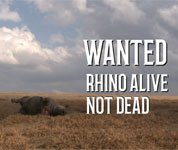Links
Looking for more information on rhino poaching and dehorning? You'll find it at these links:
Events |
|||
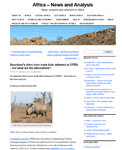
|
Proposal to lift worldwide ban on sale of rhino horn is defeatedAt the 17th meeting of the Convention on International Trade in Endangered Species of Wild Fauna and Flora (CITES), members of the group voted 100-26 (with 17 abstentions) to keep the current worldwide ban on the sale of rhino horn—even horns that are acquired during dehorning, a rhino's natural death or those confiscated from poachers. "It is a big blow but at least there are some countries in agreement and the discussion is on the table," said Lynne MacTavish of South Africa, who represented private rhino owners at the meeting. Swaziland had made the proposal to enable the sale. A news report stated that while the voting was in secret, "it is believed that Namibia, South Africa and Zimbabwe (which have the majority of Africa’s black and white rhino) supported the Swazi bid, while states like Kenya, which has a small and threatened population of rhinos, voted against." Read the full article |
||
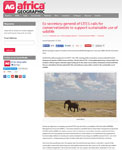 |
In late September and early Ocbober, South Africa will host the 17th meeting of the Convention on International Trade in Endangered Species of Wild Fauna and Flora (CITES). As the meetings begin, the group's former secretary-general and current president of the International Wildlife Management Consortium (IWMC) calls for conservationists to support sustainable use of wildlife (such as the dehorning and regulated sale of rhino horns): "By doing this, CITES will demonstrate that it is able to listen to those countries—many of them in Southern Africa—that have a deeper understanding of the unbreakable relationship between humans and wild species. It is people from those communities—individuals who share their living habitat with other creatures—who have the traditional scientific knowledge needed for creating programmes devoted to the sustainable use of wildlife, not the 'laptop environmentalists' in London, Washington and Paris." |
||
News Media |
|||
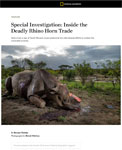 |
A report by National Geographic investigative reporter Bryan Christy on the illegal trade in rhino horn in South Africa and the connection to organized crime from Asia. With an excellent map showing the route the poached horns take. Also, a National Public Radio interview with Christy. |
||
 |
Listen to South African wildlife reserve manager Charles Theron describe a poacher attack (the same one illustrated on the home page of this site) to BBC radio. |
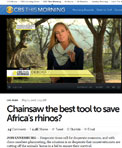 |
CBS News: This report and accompanying video explain dehorning well (ignore the ridiculous comments by the host in the studio at the end of the video!). |
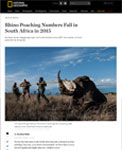 |
National Geographic: “For Africa as a whole, this [2015] is the worst year in decades for rhino poaching,” according to TRAFFIC, a wildlife trade monitoring group. |
 |
"Rhino in Crisis: A Blueprint for Survival": a documentary on Vimeo. (Run time: 60 minutes) |
 |
The Atlantic magazine: Why there's a demand for rhino horn in Vietnam. |
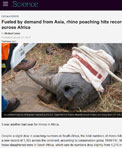 |
Fox News: The rise of rhino poaching across Africa. |
Conservation Groups |
|||
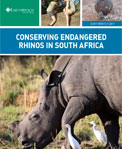 |
Want to help scientists study rhinos? Earthwatch.org provides manpower (and womanpower) for scientific expeditions all over the world. This one is at a beautiful private reserve in South Africa. |
 |
An Earthwatch report on the declining numbers of rhinos. Want to help save rhinos? Earthwatch provides volunteer manpower for scientists studying rhinos in South Africa. Check out this expedition. Highly recommended. |
 |
SaveTheRhino.com: A London-based rhino conservation organization. |
 |
RhinoAlive.com: a South Africa-based group supporting the legalization of rhino horn sales to help reserve owners protect their animals. |
 |
StopRhinoPoaching.com: A South Africa-based organization that fights poachers by supporting and training rangers. |
 |
A blog post by a UK-based conservationist about a debate whose topic was "Should the global trade of rhino horn be legalised?" |
Academic and Think-Tank Papers |
|||
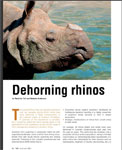 |
Rhino Resource center: A study on the effectiveness of dehorning. |
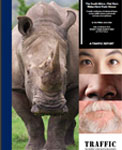 |
"The South Africa – Viet Nam Rhino Horn Trade Nexus: A deadly combination of institutional lapses, corrupt wildlife industry professionals and Asian crime syndicates" by TRAFFIC, the wildlife trade monitoring network. (PDF) |
